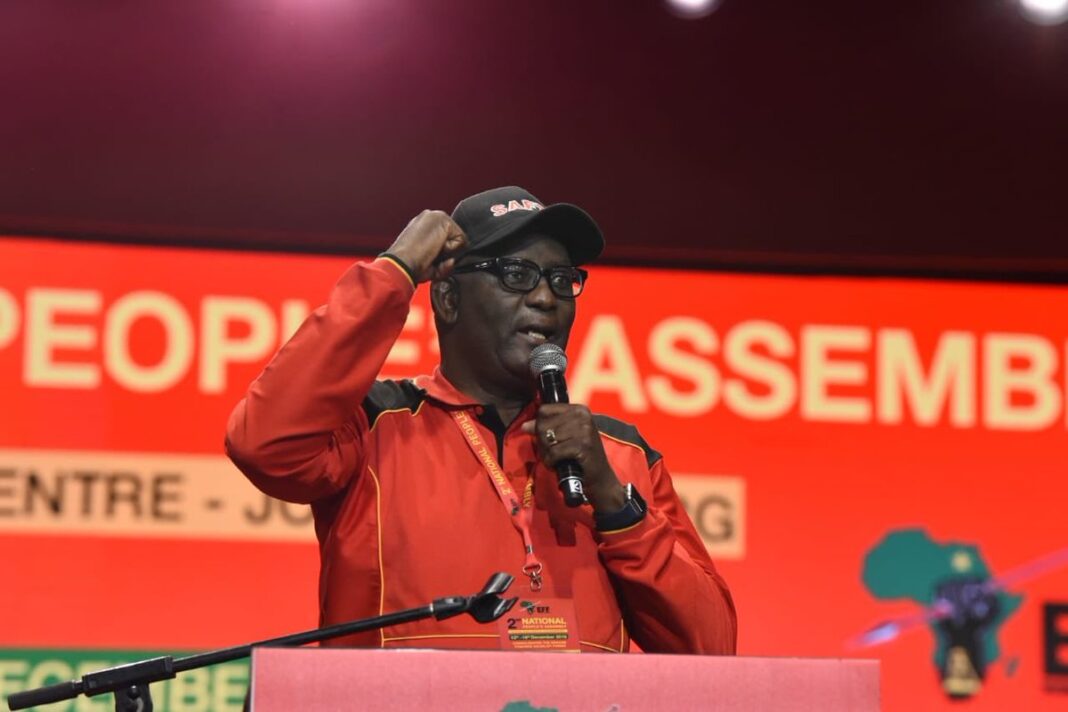THE South African Federation of Trade Union (SAFTU) said on Sunday that there is a very strong link between massive electricity price hikes, corruption and the drive to privatise energy supply.
This comes after Eskom announced electricity price hikes on Thursday, well above inflation, at over 15.6% more after the North Gauteng High Court granted the power utility permission to raise electricity prices.
This will see the embattled state-owned entity recover about R10 billion from customers.
SAFTU said electricity prices have been hiked unreasonably by Eskom managers because, through their corruption, the company pays for coal-fired power plants that include bonsalas to the ruling African National Congress (ANC) through its investment arm Chancellor House, as well as paying for coal at inflated rates.
“In this context, there is a persistent collusion of those in government and the parasitic capitalists looking to enrich themselves from the pockets of consumers,” said SAFTU’s General Secretary, Zwelinzima Vavi, in a statement.
“The question is: why does Eskom increase electricity way above inflation rate? The answer lies in the extreme corruption and mega-project addition that have crippled the generation of energy, and immersed Eskom in R500 billion of debt, leading to international credit rating downgrades of the South African government, unprosecuted corruption that leads to the very top of the South African ruling party, and on top of all that, the worst load shedding in Eskom’s history.”
Last week, SAFTU laid charges of corruption, fraud and money laundering against the leadership of Eskom, South32, Seriti, Pembani, and others.
“Under the guardianship of Energy Minister Gwede Mantashe and Public Enterprises Minister Pravin Gordhan, Eskom is entering into a 10-year deal with Seriti,” said Vavi.
“That firm recently bought South32 operations so as to send profits to the world’s largest mining house –Australian-based BHP Billiton, from which South32 was spun off –through charging Eskom the inflated price of R478.40 per tonne.”
As of Thursday April 1, electricity prices were increased by15%, at a time the rate of inflation has fallen below the 3-6% target.
A 15% increase is many times the inflation rate of the first quarter, said SAFTU.
“This increase is nearly three times more than the projection made in 2018, of 5.2%, by National Energy Regulator of South Africa (NERSA). Over the past fourteen years, electricity has consistently risen way above the rate of inflation. In 2020, the price of electricity increased by 8.0%, in 2019 by 13.8% and in 2018 by 5.2%. Between 2007 and 2020,the price increased by 460% (before inflation); the ‘real’ after-inflation rate increase was 205%,” said Vavi.
Vavi said SAFTU is encouraging all working class people, who suffer most from the electricity hikes, to organise resistance and fight for a transformed Eskom, and a move towards a genuine Just Transition with green energy production.
“Through a vision of renewable energy, working-class coordination and self-management, community-based empowerment, municipal cross-subsidisation and a transformed Eskom’s overall support at the scale of a national grid, SAFTU intend to rally all progressive organisations to resist the neoliberal onslaught and corruption, and to offer an affordable alternative that will bring South Africa’s massive untapped wind and solar power to ordinary people,” he said.
- Inside Politics



